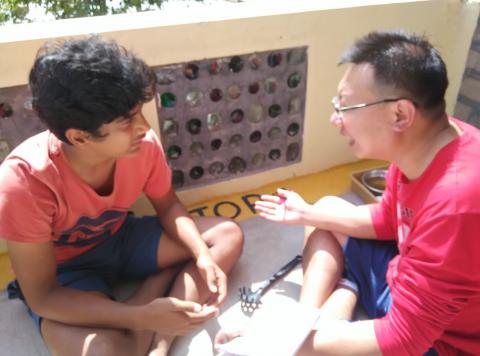
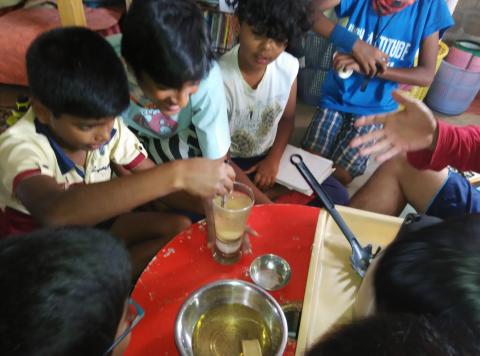
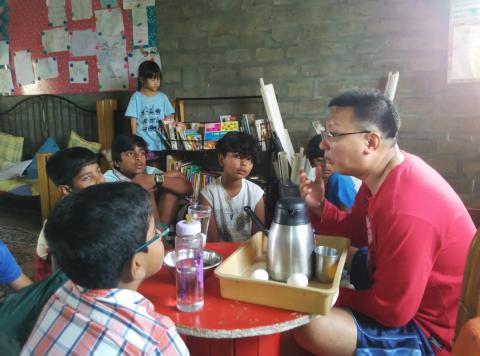
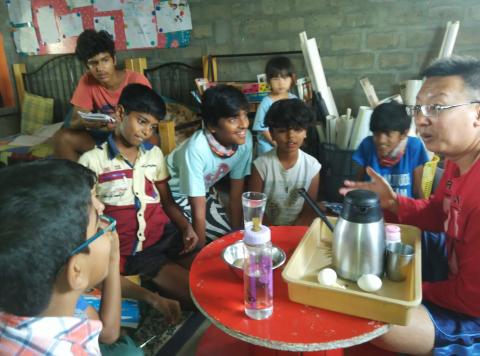
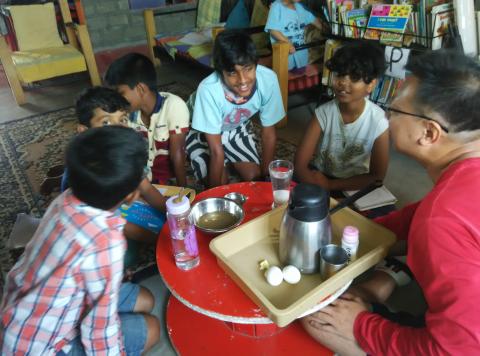
If you want to be smarter than me, work harder than me. Says, Mr. Seea scientist from Malaysia.
Explored density with him…more than the experiment he emphasised on ‘ don’t give up’. He encouraged ‘you are future scientist, think hard, try more, do more ‘.
Why egg or sand sinks and watermelon floats?
To make a heavy thing float what do you need?
Why salty water heavier than normal water?
Why ice floats?
Why soap cleans?
Why oil goes inside the skin but not water?
A 30 minutes session to make us think.
Science is all about to THINK!But we often take it ‘facts and experiments and results’.Scientific thinking is a process, which is not about knowledge but about a skill, a way to think. Which includes thinking in a scientific way by way of observing a scientific phenomenon, asking a question on what, why how natural phenomenon (including machine), making a hypothesis, correlating experimenting and concluding.
- Create opportunities to notice different scientific phenomena, collect scientific data, correlate different observation to conclude, to make hypothesis.
- Use different scientific tools.
- Invite questions, create the environment of questioning, wondering. Not look for scientific knowledge or seek/give an answer. Notice share and-and ask questions.
- Give a problem and or a challenge and ask a question to solve, set experiment.
- Ask question to test proved scientific concepts, question beliefs.
- Use different material and resources to experiment. Set up activities to experiment with the same phenomenon in different places. Set up experiment to test an hypothesis. Do not conclude so soon – Set up more experiments.
- Show or share “a creeper climbing in without any root. A leaf changing its colour, a creeper climbing on different trees in different form, different chargers having different ratings.
- Use a tool like a magnifying glass to see.
- Do activity like “jump and observe heart beat and breathing”.
- Notice specific actions like “movement” of big and small wheel in a machine. (If I say observe machine, it has the danger of observing the colour of the machine :-)
- While observing any creature, not focus on its color shape and size. rather observe how it walks? Or how the color and size affect his walk or what is the role of color? How many legs he has? When it walks does it use all of its legs? Does he have face? Does it breathe? how it breaths? Etc..
- Collect quantitative data – like collect temperature every day
- Collect qualitative data like where all do I see things blowing like milk boiling, puri blows up, swelling is blowing, bump on the head is blowing and so on. But my tiffin does not blow with heat or bump it shrink and I collect data on shrinking ……………..and the chain continues.
- Give exposure to a various scientific phenomenon and directly ask question “what question are coming to mind?” See a video about any science concept and write five questions about the concept. Notice and ask “Where else do I see things which blow”.
- Question what wind is made up of, why it moves in a certain direction, how I can apply my understanding about wind energy to address my needs, etc? Similarly, ask a question about feelings. Say, what is the scare feeling made up? Is there any material which is generated or moves inside my body? What is the effect of this feeling on my stomach, hand, tongue, lungs….? How long is the effect of this feeling? How can I measure the intensity of my feelings, etc?
- Notice a scientific phenomenon and share “Sun red in the evening”.
- Problem solving situation like pressure cooker not whistling or curd is not setting, clothes not getting dried, water not coming in tap, at hill station soap not getting washed away…..
- Create challenge like Make a stone float.
- Question proved scientific concepts like “sun is the source of energy of light for earth, Planet does not sparkle”
- Question beliefs – What is in Vaccine, which makes me safe? What will happen If I do not get vaccinated?
- Observe and then the question – Puri is blowing up (observe). Where else do I see this happening (now I can make you think).
- By using material, resources – Take different liquid of different density and play with it. Like touch, mix, taste, heat etc…
- Activities to experiment with the same phenomenon in different places – So one meets evaporation in cooking, in rain cycle, in farming, in drying wings of birds and so on.
- Set up an experiment to test a hypothesis “I think bore-well water causes people to become black or develop stomach disease” “I think bathing is hygienic”.
- Do not conclude so soon – Set up more experiments.
- Observer different things in different places and I correlate. Puri also blows up and milk also blows up – I make conclusions that it may be to do with the temperature and further investigate and experiment. When I ask you to correlate – Bernoulli’s theorem is a correlation of speed, volume, and pressure. Archimedes is between density and volume, Newtons; first law – correlation of action and reaction
- Make conclusions based on – Collect data and conclude based on those – All things with water evaporates, Evening sun is Orange.
- Questioning leading to conclusion – Why do rainbows are found and I come up with my own answer. Sugar mixes in water because it is sweet, Salty things also dissolve because they are salty, so salty and sweet things dissolve.
- Do experiments and conclude – All things heated up with water blows up.
- Co-relation can lead to a conclusion – Mix water in various sherbets and juices hence water is sweet.